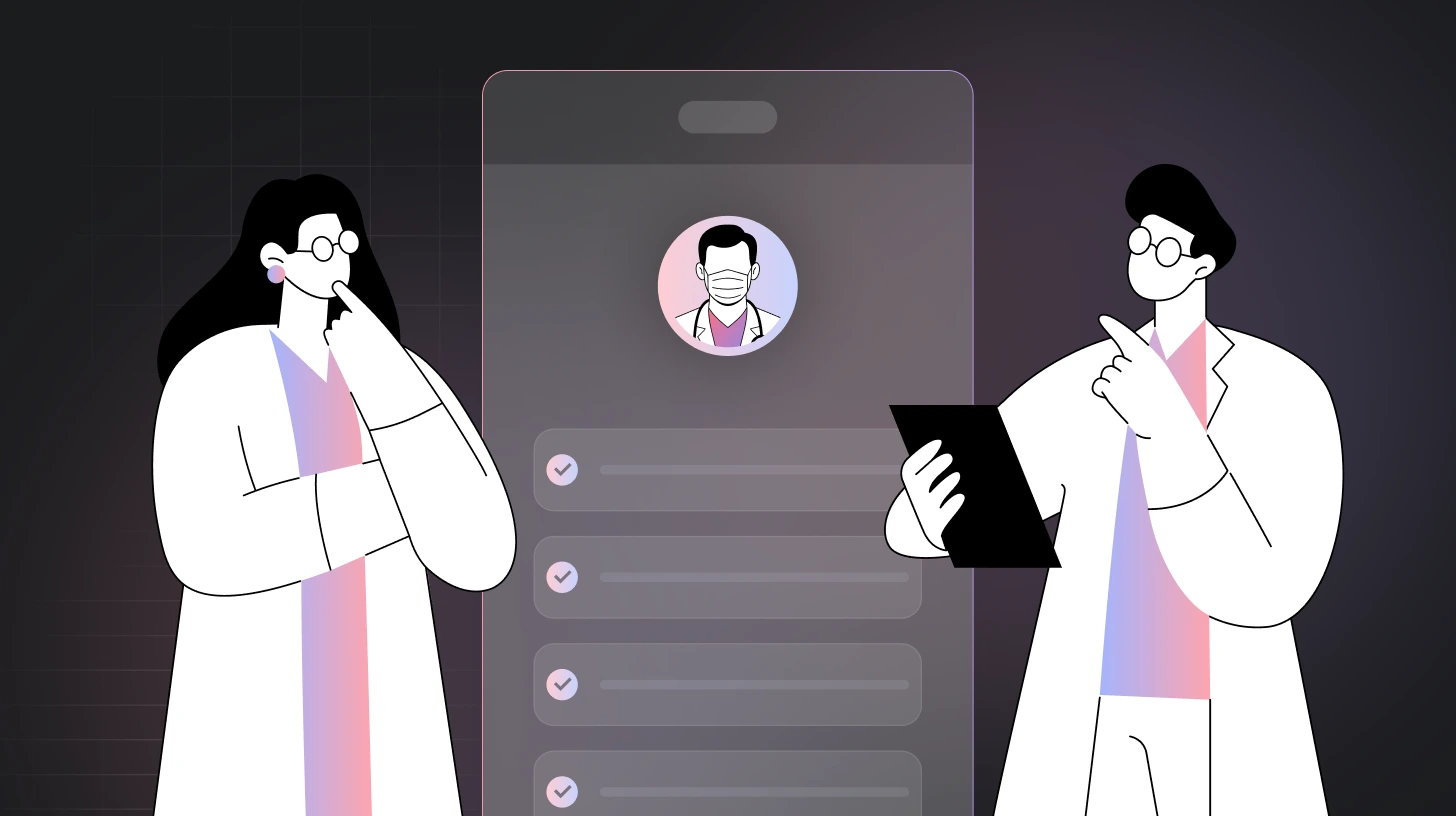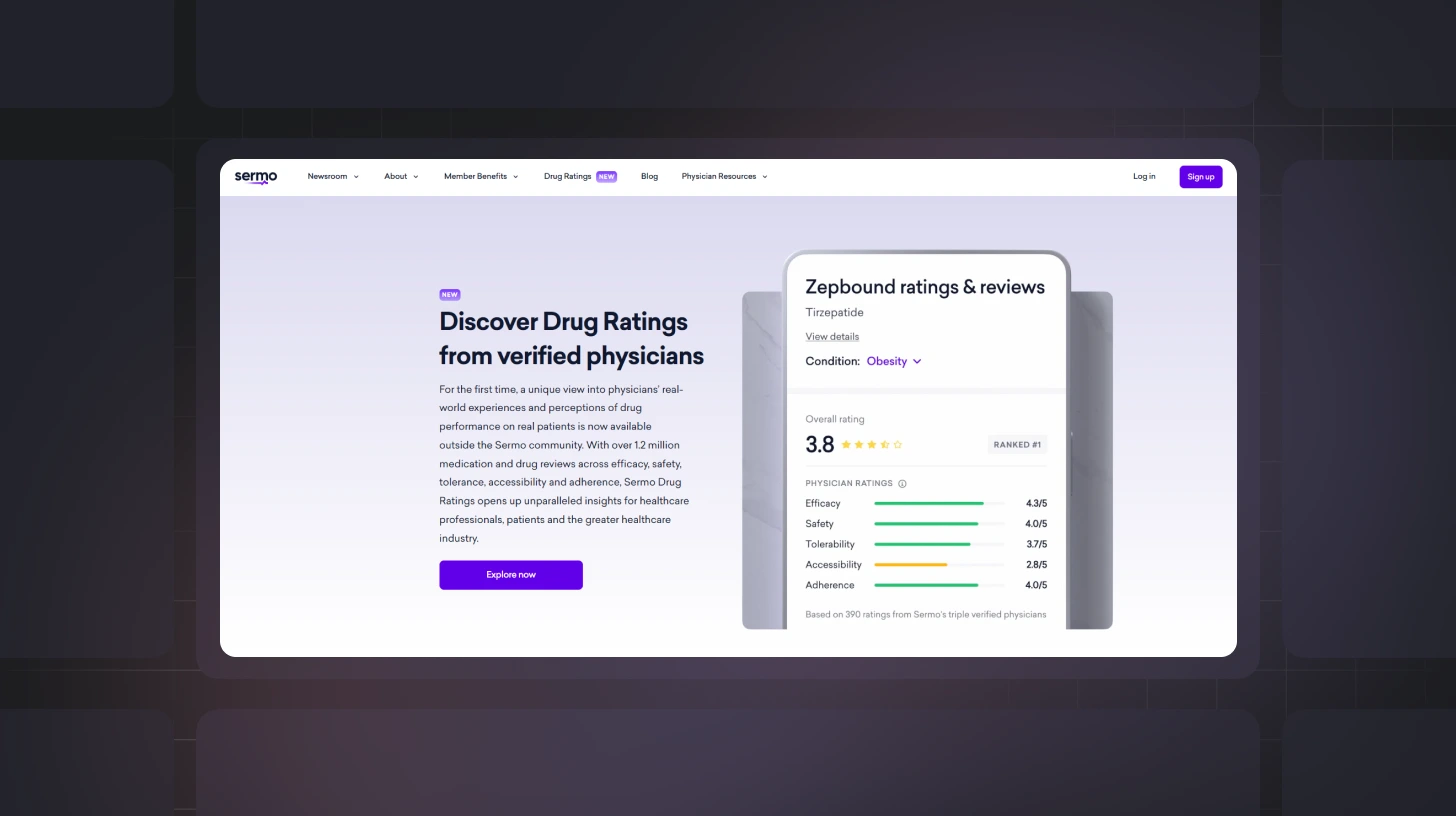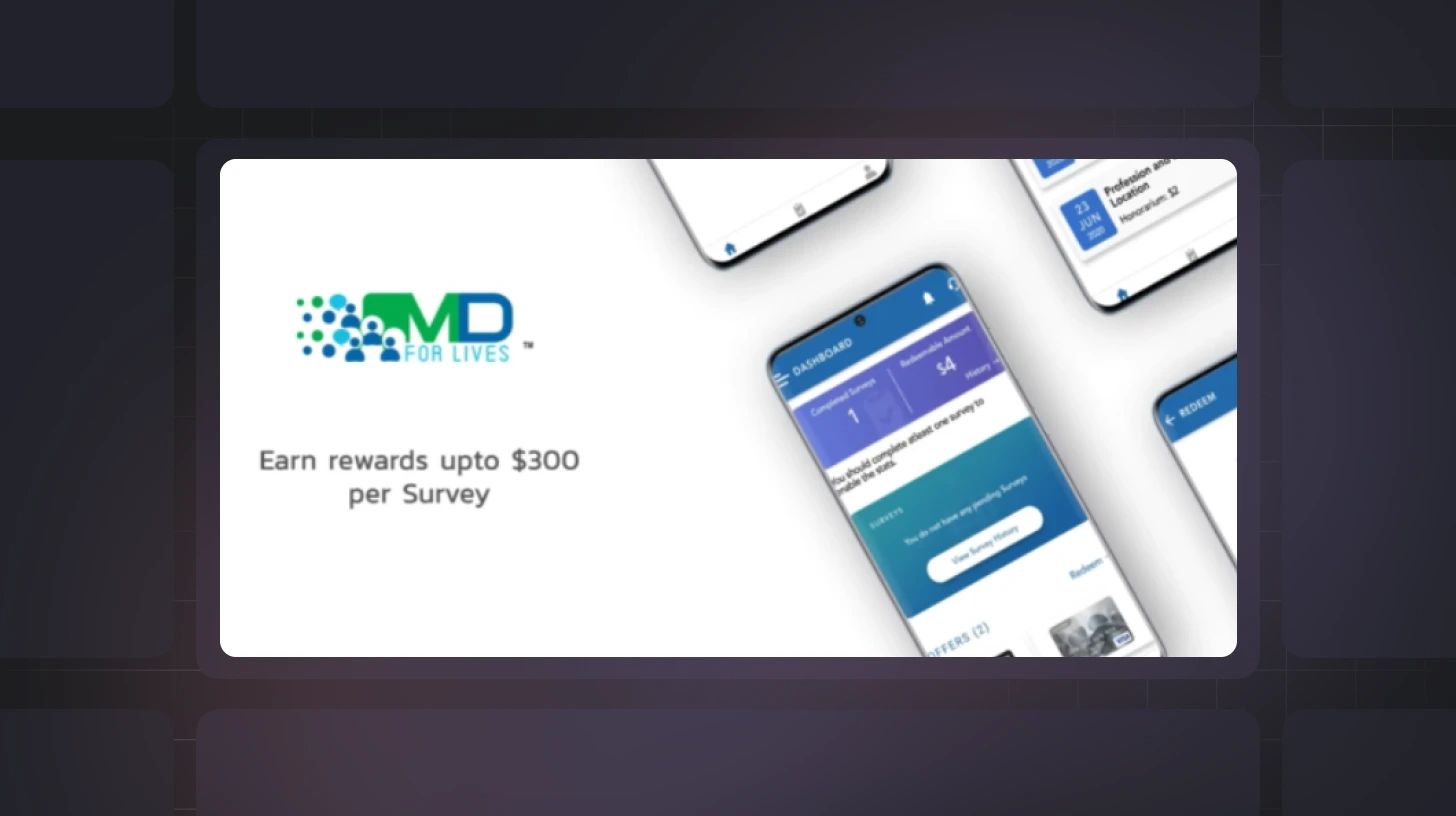The Ultimate Guide to Medical Market Research Surveys in 2025

In 2025, healthcare professionals are turning expert opinions into income and impact. How? Through medical market research surveys that influence the future of medicine. If you’re new to medical market research surveys, this guide covers everything you need to know: how they work, top platforms, best practices, and how to start earning from your clinical expertise.
What Are Medical Research Surveys?
Medical research surveys are online questionnaires and interviews that collect expert clinical insights from healthcare professionals. Companies use this feedback for:
- Healthcare market research
- Drug development and trials
- Patient opinion surveys
- Product testing
- Marketing strategies
With the growing demand for online medical market research surveys, platforms are now offering easier access, higher pay, and mobile-friendly tools to increase participation from physicians, nurses, pharmacists, and physician assistants.
Why Participate in Medical Market Research Surveys?
Who doesn’t want free money? Medical research surveys are a win-win: healthcare professionals get paid for their time and insights, while companies gain actionable medical industry feedback to enhance their products and strategies.
By taking part in paid healthcare surveys, professionals not only support product development but also stay on top of emerging healthcare insights and clinical trends.
Physicians, pharmacists, nurse practitioners, physician assistants, and other healthcare providers regularly take part in medical market research surveys, offering real-world insights that help shape new treatments and pharmaceutical marketing strategies.
For instance, pharmaceutical companies may analyze medical survey data to improve drug formulations, adjust dosage recommendations, or refine messaging based on provider preferences and patient outcomes.
Thanks to technology, most online medical surveys can be completed at your convenience during a lunch break, between appointments, or even at home. Many platforms now offer mobile apps and medical survey tools that make participation fast, easy, and seamless.
However, not all medical research survey platforms are created equal. For the best experience, choose platforms that ensure confidentiality, offer reliable compensation, and provide opportunities tailored to your clinical specialty.
Top Paid Medical Market Research Platforms for Healthcare Professionals
1. Sermo
Sermo connects healthcare professionals to a global network where their insights directly shape healthcare advancements. Physicians can contribute critical feedback on clinical issues and stay informed on cutting-edge topics like drug reviews and peer discussions. It’s a streamlined platform for those looking to influence the future of medicine while expanding their professional knowledge.
- Features: Connect with over 1 million healthcare professionals globally while participating in tailored surveys and discussions.
- Payment Options: Offers multiple payment methods, including PayPal, direct deposit, and gift cards.
- Key Highlights: Sermo isn’t just a survey platform; it’s a thriving community where you can engage with peers, share cases, and access drug reviews. It stands out for its combination of research opportunities and a social network feel.

2. InCrowd
InCrowd shines with its focus on speed and ease. Its micro-surveys are perfect for squeezing into even the busiest schedules. Physicians can deliver impactful insights without sacrificing their time, while the platform’s mobile compatibility ensures access on the go. If time is your concern, InCrowd has you covered.
- Features: Specializes in micro-surveys that typically take less than 10 minutes to complete.
- Payment Options: PayPal or gift cards.
- Key Highlight: The platform’s mobile-first approach makes it incredibly convenient for busy professionals. With 70% of surveys completed on mobile devices, it’s a go-to for quick and efficient participation.
3. MDForLives
MDForLives takes your participation global, connecting professionals across borders to shape healthcare innovation. Whether it’s through surveys or detailed interviews, the platform ensures that your voice contributes to critical discussions. Its generous sign-up bonuses and well-designed interface make it an ideal choice for new participants.
- Features: Offers a mix of surveys, interviews, and group discussions designed to influence global healthcare advancements.
- Payment Options: Rewards participants with gift cards from top brands like Amazon and Visa.
- Key Highlight: Known for its international reach and competitive compensation. A $20 sign-up bonus and an easy-to-navigate interface make it a favorite among healthcare professionals worldwide.

4. ZoomRx
ZoomRx simplifies participation with user-friendly features like voice response and mobile access. Beyond its convenience, the platform stands out with its social mission. By partnering with Watsi, ZoomRx lets you make a real-world difference, doubling your impact through matched donations to medical initiatives.
- Features: Provides mobile-friendly surveys with innovative options like voice responses.
- Payment Options: Instant PayPal payments.
- Key Highlight: ZoomRx’s philanthropic edge—allowing participants to donate earnings to support medical treatments in developing countries—adds a meaningful dimension to earning extra income.
5. OpinionSite
OpinionSite makes earning easy and stress-free for healthcare professionals. The platform stands out with its strong focus on privacy and a wide range of surveys across medical specialties. Whether you’re sharing insights on treatments or providing feedback on new products, you’ll find opportunities that fit your expertise. Payments are flexible, with options like PayPal and gift cards, making it super convenient. Plus, its simple design ensures you can jump right in without any hassle.
- Features: Offers a steady stream of engaging surveys tailored to various medical specialties.
- Payment Options: Flexibility with PayPal, gift cards, and checks.
- Key Highlight: The platform’s quick application process and strong focus on privacy make it a reliable choice for professionals looking to earn extra income while contributing valuable insights.
Read - Online Medical Surveys for Nurses: Best Practices
Key Use Cases of Medical Surveys in Healthcare Market Research
Medical surveys are not just about collecting opinions; they’re strategic tools that drive innovation, product refinement, and patient-centric care in the healthcare industry. Here are the most impactful ways healthcare organizations, pharmaceutical companies, and market researchers use medical surveys for healthcare market research:
Drug Development & Clinical Trials
Gain early feedback from physicians and specialists on drug concepts, treatment protocols, and side effects. These insights shape safer, more effective therapies before mass release.
Healthcare Professional Sentiment Analysis
Understand how doctors, nurses, and pharmacists perceive new medications, devices, or clinical guidelines, allowing brands to tailor education and outreach campaigns accordingly.
Patient Journey Mapping
Use patient feedback surveys to understand emotional, physical, and logistical challenges during diagnosis, treatment, and recovery. This helps design better care models and improve satisfaction.
Market Demand Forecasting
Surveys can reveal shifts in treatment preferences, prescribing behavior, or unmet needs, enabling pharma and med-tech companies to prioritize high-demand areas.
Brand Awareness & Messaging Testing
Pre-test marketing materials, brand names, packaging, or digital assets with HCPs and patients before launch to ensure clarity, trust, and alignment with target audiences.
Post-Market Surveillance
Collect real-world feedback on approved products to monitor safety, efficacy, and user experience essential for regulatory compliance and continuous improvement.
Health Technology Assessment (HTA) Inputs
Many HTA bodies and payers value qualitative data from medical surveys when assessing product value, reimbursement potential, and treatment adoption rates.
Read - Guide to Medical Surveys for Physicians
Best Practices for Running Medical Research Surveys
Running a successful medical market research survey takes more than sending out a list of questions it demands strategy, timing, and participant alignment. Whether you're targeting physicians, specialists, or patients, the quality of your data depends on how you design and execute your survey.
Start with a Clear Objective
Every survey should have a defined purpose. Are you trying to validate a new drug, improve product-market fit, or understand treatment satisfaction? Narrow objectives lead to focused questions and more useful data.
Segment Your Target Audience
Medical professionals vary in expertise and experience. Customize your surveys for physicians, nurses, pharmacists, or patients. This segmentation ensures relevance and boosts completion rates.
Keep Surveys Short and Precise
Busy professionals won’t complete lengthy forms. Aim for 10–15 well-crafted questions. Concise, respectful surveys are more likely to generate high-quality responses.
Use Conversational, Jargon-Free Language
Avoid industry buzzwords or complex medical terms, especially for patient-focused research. Keep questions clear, neutral, and easy to answer.
Example: Instead of “Evaluate the pharmacodynamic impact of treatment X,” ask “How effective was the treatment for your symptoms?”
Combine Question Types
Blend multiple-choice questions, Likert scales, and open-ended responses. This allows for both structured data and insightful qualitative feedback.
Optimize Survey Timing
Timing impacts participation. Send surveys after relevant events, like post-treatment, post-prescription, or product trial. For HCPs, early mornings, evenings, or weekends often yield better engagement.
Use Secure, Mobile-Friendly Platforms
Choose HIPAA-compliant platforms and ensure surveys are mobile-optimized. Many respondents prefer answering via smartphone during short breaks or downtime.
Provide Fair Incentives
Offer appropriate compensation for time, especially for longer or specialized surveys. Paid medical surveys typically yield better participation and more thoughtful answers.
Tips for Getting Started with Medical Market Research Surveys
Getting started with medical market research participation is easier than you think. A few simple habits can maximize your success and earnings:
- Set a Dedicated Survey Schedule: Block out time during lunch, between appointments, or in the evening. Having a routine prevents missed opportunities.
- Track Your Payments and Income: Use tools like QuickBooks, Mint, or Google Sheets to record income, making tax season stress-free and ensuring all payments are accounted for.
- Join Multiple Survey Platforms: Expand your reach and increase your earnings. Platforms like TheySaid, Sermo, ZoomRx, and InCrowd offer diverse survey types across different specialties.
- Build a Strong Professional Profile: Take the time to complete your profile accurately. A detailed profile means better survey matches and higher qualification rates.
- Use Mobile Apps for Convenience: Many top survey platforms offer mobile apps. Whether you're waiting for your next patient or taking a coffee break, you can complete surveys on the go.
- Stay Consistent and Active: Regular participation helps you become a preferred contributor. Consistency leads to more invitations and higher-paying opportunities.
Also Read: Why Online Medical Surveys Are Changing Healthcare Feedback
Why TheySaid Is Built for Medical Market Research Surveys
You’ve seen how medical research surveys offer a powerful way to earn extra income while contributing to real innovation in healthcare. Whether you’re a physician, nurse, or specialist, your insights directly shape the future of pharmaceutical marketing analysis, patient care, and clinical decision-making.
But here’s the truth: even the best-intentioned medical market research surveys often fall short. Why? Because traditional platforms struggle with:
- Low engagement rates
- Generic, one-size-fits-all questions
- Difficulty in extracting real, actionable insights
TheySaid is an AI-driven survey platform purpose-built to transform how healthcare companies conduct market research.
With TheySaid, you can:
- Create intelligent surveys in a single click
- Run moderated interviews at scale
- Analyze results instantly with AI
- Detect trends automatically
- Integrate with Slack, email, and your CRM
From optimizing pharmaceutical research and collecting patient opinion surveys, to gathering specialty-level insights from nurse practitioners and physician assistants, TheySaid is the missing link between healthcare professionals and decision-makers.
Key Takeaways
- Medical research surveys are critical for understanding HCPs and patients.
- AI tools like TheySaid turn physician surveys and HCP feedback tools into actionable healthcare insights for clinical innovation.
- Use medical survey tools that adapt in real-time and engage deeply.
- Insights from patient opinion surveys and clinicians drive competitive advantage.
- Survey results feed into pharmaceutical marketing analysis and product innovation.
FAQs
Are there paid online nursing surveys?
Yes, many market research firms offer paid surveys for nurses. These might focus on hospital workflows, treatment administration, or new product feedback. Compensation varies by length, region, and respondent specialty.
What are medical research surveys used for?
Medical research surveys collect insights from healthcare professionals or patients to support product development, clinical trials, pharmaceutical marketing analysis, and policy decisions. These surveys are crucial for evidence-based innovation and customer feedback loops.
How do online medical market research surveys work?
These surveys are typically distributed via email, panels, or AI tools like TheySaid. Respondents answer questions via web or mobile interfaces, often in real-time. They’re faster, more scalable, and can deliver deeper insights through dynamic questions.












.svg)






.svg)